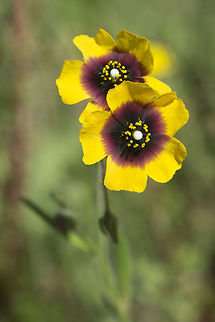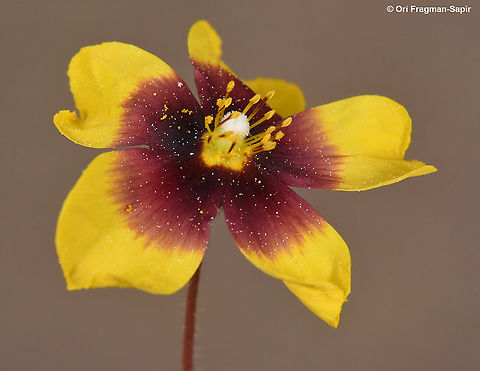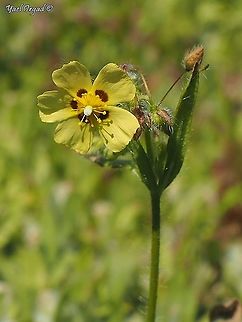
Appearance
''Tuberaria guttata'' is an annual plant that grows to 2–30 centimetres tall. It has a rosette of basal leaves, each up to 3 cm long and 1.5 cm wide, but this rosette has normally withered by the time the plant is in flower. The stems bear 2–5 opposite pairs of leaves, and a few smaller leaves higher up, arranged alternately.The inflorescence comprises around 12 flowers, 8–12 mm in diameter. Each flower has five uneven sepals and five yellow petals usually with a dark red spot near the base. The flowers are cleistogamous, producing little pollen and no nectar, and attracting few insect visitors, and the petals fall off after only a few hours. The centre of the flower houses around 20 stamens and a single capitate stigma.
The fruit of ''T. guttata'' is a capsule containing many seeds, each 0.6 millimetres long.

Distribution
''Tuberaria guttata'' is widely distributed in the Mediterranean region, and has a continuous distribution along the French Atlantic coast as far as the Channel Islands. Further north, its distribution is very patchy, being confined to a few localities on the west coasts of Ireland and Wales. The best-known of these populations is on the slopes of Holyhead Mountain in Anglesey. These British populations mark the northernmost limit of the species' distribution. ''Tuberaria guttata'' was chosen by Plantlife as the county flower of Anglesey in 2002.In California, ''T. guttata'' has become naturalised in the foothills of the Sierra Nevada on the eastern edge of the Sacramento Valley.
In the Mediterranean region, ''T. guttata'' is common in arid habitats from woodlands to grasslands and roadsides. In the British Isles, it grows "in bare patches of thin, dry soil overlying hard igneous rock in open areas within wind-cut heath near the sea".

Habitat
''Tuberaria guttata'' is widely distributed in the Mediterranean region, and has a continuous distribution along the French Atlantic coast as far as the Channel Islands. Further north, its distribution is very patchy, being confined to a few localities on the west coasts of Ireland and Wales. The best-known of these populations is on the slopes of Holyhead Mountain in Anglesey. These British populations mark the northernmost limit of the species' distribution. ''Tuberaria guttata'' was chosen by Plantlife as the county flower of Anglesey in 2002.In California, ''T. guttata'' has become naturalised in the foothills of the Sierra Nevada on the eastern edge of the Sacramento Valley.
In the Mediterranean region, ''T. guttata'' is common in arid habitats from woodlands to grasslands and roadsides. In the British Isles, it grows "in bare patches of thin, dry soil overlying hard igneous rock in open areas within wind-cut heath near the sea".
References:
Some text fragments are auto parsed from Wikipedia.